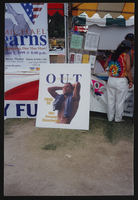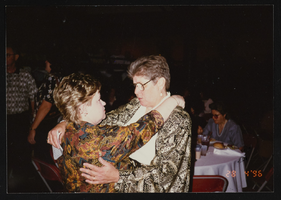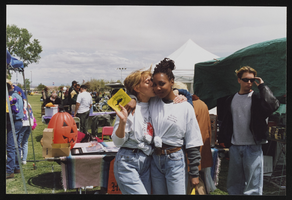Search the Special Collections and Archives Portal
Search Results
Jessica Guiao oral history interview
Identifier
Abstract
Oral history interview with Jessica Guiao conducted by Grecia Lopez on November 22, 2022 for the Reflections: the Las Vegas Asian American and Pacific Islander Oral History Project. In this interview, Guiao recalls her childhood in Hayward, California, and being raised in Las Vegas, Nevada. She recalls not liking the climate of Nevada at first, and describes the friends she has made throughout her time in the city and the identity she has developed. Guiao discusses some of the pressures and stereotypes surrounding Asian Americans, such as what career path they should pursue or the aversion to embracing subcultures, and how she has consolidated her rebellion into her own identity. Throughout the interview, Guiao touches on other topics such as Filipino food, the long-standing history between Mexican and Filipino communities, Catholicism, goth culture, and anti-Asian hate and racism that she and her family has faced.
Archival Collection
Biography, Gay, Sam, 1909-1972
Level of Description
Archival Collection
Collection Name: Las Vegas Library Regional History Files Collection
Box/Folder: Box 03
Archival Component
Maxine Butler oral history interview
Identifier
Abstract
Oral history interview with Maxine Butler conducted by Frank Johnson on April 22, 2016 for the African Americans in Las Vegas: a Collaborative Oral History Project. In this interview, Butler discusses her early life in Jonesboro, Louisiana. She talks about moving to Las Vegas, Nevada in 1965, the Westside, and businesses on Jackson Street. Butler recalls working at The Cove as a cocktail waitress, the reopening of Moulin Rouge Hotel, and the African American community on the Westside. Later, Butler discusses her involvement at Greater Evergreen Missionary Baptist Church, the importance of church to the African American community, and compares church life in Jonesboro and Las Vegas. Lastly, Butler talks about changes in the Westside.
Archival Collection
Gay Life Newsletters, 1984
Level of Description
Archival Collection
Collection Name: Gay Life Newsletters
Box/Folder: Box 01
Archival Component

Poster for Out Las Vegas magazine at Gay Pride: photographic print
Date
Archival Collection
Description
Image
Gerald L. Connor oral history interview
Identifier
Abstract
Oral history interview with Gerald Connor conducted by James Bonnell on February 22, 1977 for the Ralph Roske Oral History Project on Early Las Vegas. Connor first discusses moving to Las Vegas, Nevada and serving as a pilot in the United States Air Force. He then discusses his education at the University of Nevada, Las Vegas and his church membership. Topics that Connor discusses during the interview also include changes in the school district and properties located in Downtown Las Vegas and the Las Vegas Strip, his political activity within the Democratic Party, the Helldorado Parades, and the early atomic tests at the Nevada Test Site.
Archival Collection
Peter F. Perazzo oral history interview
Identifier
Abstract
Oral history interview with Peter F. Perazzo conducted by Claytee D. White on July 22, 2016 for the Building Las Vegas Oral History Project. In this interview, Perazzo discusses his personal history and moving from Reno, Nevada to Las Vegas, Nevada in the 1940s. Perazzo talks about his Native American ancestry, his career in land surveying, and how construction and land surveying have changed over the years. He then describes designing public and residential buildings in Las Vegas, and at the Nevada Test Site. Later, Perazzo discusses his employment at the United States Bureau of Land Management (BLM) in 1985 and in 1995 at the Nevada Department of Transportation, where he was involved in many state projects such as the Hoover Dam bypass, Red Rock state road, and freeway widening.
Archival Collection

Gay and Lesbian Community Center Honorarium at Utopia Nightclub in Las Vegas, Nevada: photographic prints
Date
Archival Collection
Description
From the Las Vegas Bugle Photograph Collection on Lesbian, Gay, Bisexual, and Transgender History (PH-00336). Gay and Lesbian Community Center Honorarium (April 28, 1996) at Utopia nightclub.
Image

Fetish and Fantasy Halloween Ball booth at Gay Pride: photographic print
Date
Archival Collection
Description
Image
Stella Champo Iaconis oral history interviews
Identifier
Abstract
Oral history interviews with Stella Champo Iaconis conducted by Elizabeth Nelson Patrick on July 22, 1981 and July 23, 1981 for the Ralph Roske Oral History Project on Early Las Vegas. Iaconis discusses her personal history and family background. Iaconis also recalls moving from Sparks, Nevada to Las Vegas, Nevada and provides a recollection of the city. Iaconis then discusses Block 16 and the increase of women working in Las Vegas, Nevada.
Archival Collection
